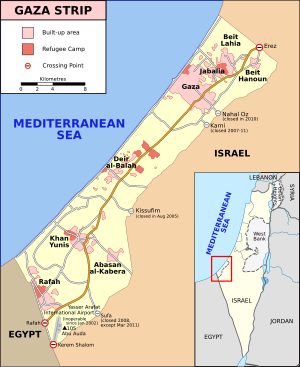Fatah–Hamas conflict facts for kids
Quick facts for kids Fatah–Hamas conflict |
|||||||
|---|---|---|---|---|---|---|---|
 Map of the Gaza Strip |
|||||||
|
|||||||
| Belligerents | |||||||
Supported by: |
|||||||
| Commanders and leaders | |||||||
| Strength | |||||||
| Izz ad-Din al-Qassam Brigades: 15,000 Executive Police Force: 6,000 |
National Security: 30,000 Preventive Security Service: 30,000 General Intelligence: 5,000 Presidential Guard: 4,200 Al Aqsa Martyrs Brigade: Several thousand |
||||||
| Casualties and losses | |||||||
| 83 killed | 165 killed | ||||||
| 98 civilians killed 1,000+ wounded on both sides Total: 350 to over 600 killed |
|||||||
The Fatah–Hamas conflict is an ongoing disagreement between two major Palestinian political groups: Fatah and Hamas. This conflict led to Hamas taking control of the Gaza Strip in June 2007. Even today, efforts to bring these two groups together and unite their governments are still ongoing. Because of this, the situation is sometimes called a "frozen conflict."
From January 2006 to May 2007, over 600 Palestinians lost their lives in the fighting. More people were killed or executed in the years that followed as the conflict continued.
Contents
Understanding the Conflict
How Hamas Started
Hamas was formed in 1987, shortly after a major uprising called the First Intifada began. It grew out of a group called the Egyptian Muslim Brotherhood. Hamas is a Palestinian organization that follows Sunni Islam. Many countries and international groups, including Australia, Canada, the European Union, and the United States, see Hamas as a group that uses violence.
Rising Tensions Between Groups
Problems between Fatah and Hamas began to grow in 2005, after the death of Yasser Arafat in November 2004. After the election on January 25, 2006, Hamas won. This led to small fights between the groups. These fights became more serious because Fatah and Hamas could not agree on how to share power in the government.
The situation got much worse in June 2007. This led to Hamas taking control of Gaza. A big problem was who would control the border crossings, especially the one called Rafah Border Crossing.
Government Changes and Challenges
After winning the election, Hamas leader Ismail Haniya formed a new Palestinian government on March 29, 2006. Most members of this government were from Hamas. Fatah and other groups refused to join. This was mainly because Hamas would not agree to certain conditions, like recognizing Israel. Because of this, many countries, including Israel, the United States, and European Union countries, refused to work with the Hamas government and placed restrictions on them.
In June 2006, Hamas fighters took an Israeli soldier named Gilad Shalit from Gaza. After this, Israel arrested many Palestinian lawmakers and ministers in the West Bank. Israel also increased its restrictions on Gaza.
In February 2007, Fatah and Hamas signed an agreement to try and form a unity government and stop the violence. In March 2007, a new national unity government was formed with both Hamas and Fatah ministers. However, in June 2007, Hamas fighters took full control of the Gaza Strip. They removed all Fatah officials.
President Mahmoud Abbas then declared a state of emergency. He fired the unity government and appointed a new emergency government. He also changed some laws to do this without needing approval from the Palestinian parliament.
Gaza's Current Situation
Since June 2007, Hamas has been the main governing power in the Gaza Strip. Since then, Hamas has been involved in several conflicts with Israel. As a result, the Palestinian Authority is now split into two parts. Each part believes it truly represents the Palestinian people. One part is the Fatah-ruled Palestinian National Authority in the West Bank, and the other is the Hamas Government in Gaza.
See also
- Black September
- Hamastan
 | Lonnie Johnson |
 | Granville Woods |
 | Lewis Howard Latimer |
 | James West |

